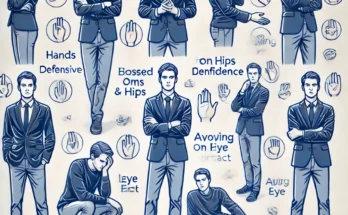Listening Skills: Major Behavior Patterns for Effective Communication
good listening habits Listening is terribly underestimated among communication skills. It benefits relationships by building understanding and eliminating communication conflict from misunderstanding. Some major behavior patterns are enumerated as follows, which will clarify what distinguishes good listening habits from listening techniques. https://venombil.com/body-language/

1. Eye Contact
An effective listener keeps appropriate eye contact with the speaker. This aids in showing the speaker that the listener is engaged and active in the conversation. This builds trust for both parties while making the speaker feel that he or she is being listened to and valued.
2. Never Interrupt
Interrupting does considerably more to spoil conversation than anything else since it can disrupt concentration. An active listener practices patience; he or she waits for the speaker to pause naturally before resuming the response.
3. Using Positive Body Language
Physical signs of being in tune with the conversation include nodding, leaning slightly forward, and adopting an open posture. These assure the speaker that their audience is paying attention.
4. Providing Verbal Encouragement
It is either a yes or a no. Some positive input like, “I see,” or “That makes sense,” goes a long way to uplifting the speaker’s morale to express more.
5. Asking Open Questions
This draw helps them engage in deeper discussion. A speaker asking, “Can you elaborate on that?” or “How would you have felt if that had happened to you?” will seem engaged and curious.
6. Paraphrasing and Summarizing
A person rephrasing a statement with their words in a conversation signals that they understand and are trashing active listening. Some modifiers may be as easy as saying, “So, what you’re saying is….”
7. Avoiding Distractions
This is considerably important since a good listener eliminates distractions, such as checking on his phone or looking all around. Complete attention to conversations would enhance understanding and respect.
8. Manage the Emotional Reaction
Apart from this, impulse reactions generally inhibit effective communication. Good listeners retain their calm, process the information, and offer reasonable reactions and thoughts. This can happen even in really tough conversations.
9. Give Constructive Feedback
When required and appropriate, giving supportive and relevant feedback makes sense for the communication. Good listeners will offer thoughtful, friendly feedback in place of impatient ones.
10. Exercising Empathy
Listening depends a great deal on empathy. When the listening person can project into the mind of the speaker, putting themselves in the speaker’s shoes concerning feelings and opinions, communication becomes strong and meaningful.
Conclusion
Investing in good listening skills leads to open, effective communication in personal, occupational, and social functions. One can become an effective and respectful listener by maintaining eye contact, not interrupting, showing positive body language, and practicing empathy. Such habits encourage better relations, better understanding, and fruitful conversations.
Active listening is not just about hearing the words; it is also about understanding them and giving them appropriate responses. The more consistently these techniques are practiced, the better the teamwork, conflict resolution, and emotional intelligence. In addition, effective listening builds trust and creates an atmosphere of openness, thus making communication effective and fulfilling.
Strong listening skills strengthen leadership capacities, improve customer service, and nurture the workplace environment. On the personal front, good listening skills foster friendships, enhance family ties, and develop romantic relationships. Listening can make a break from trivial chit-chat to proper meaningful conversations. (good listening habits)
To round it off, good listening habits can be mutually helpful for one’s personal growth toward effective communication. Taking the time to articulate in playful confrontations can endear your relations and pave the way for better success. Once these become a part of your daily interactions, because of constant use, they would subtly develop and give birth to an empathetic and communicative world.
good listening habits https://study.com/academy/lesson/effective-listening-definition-obstacles.html



